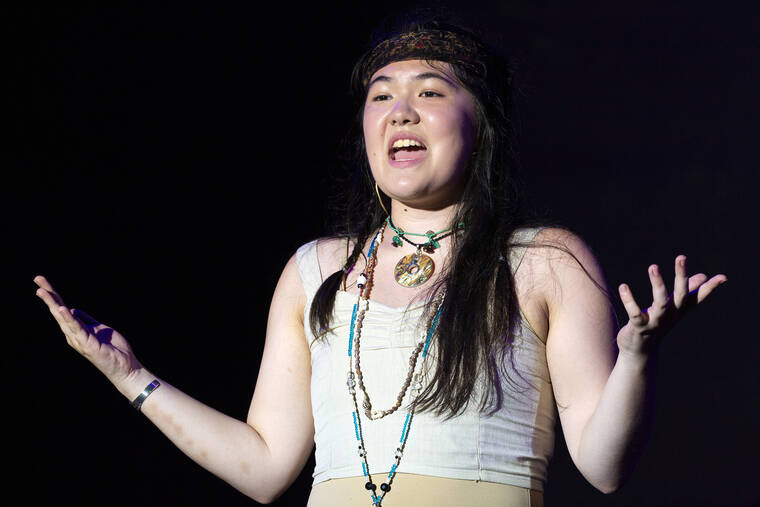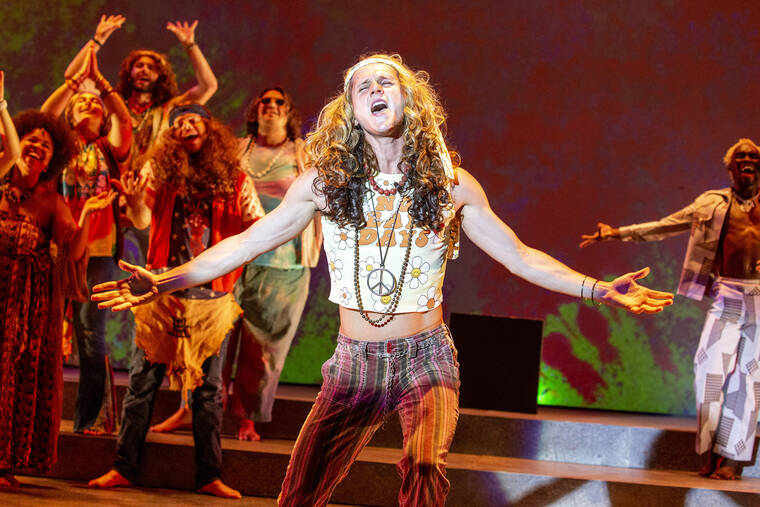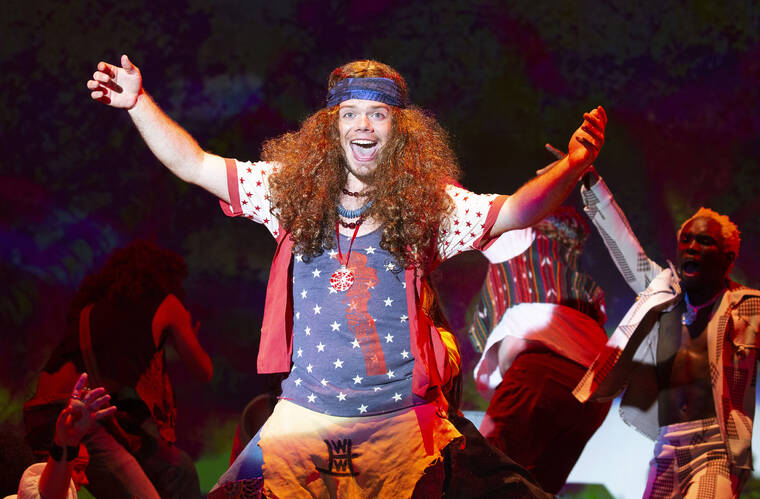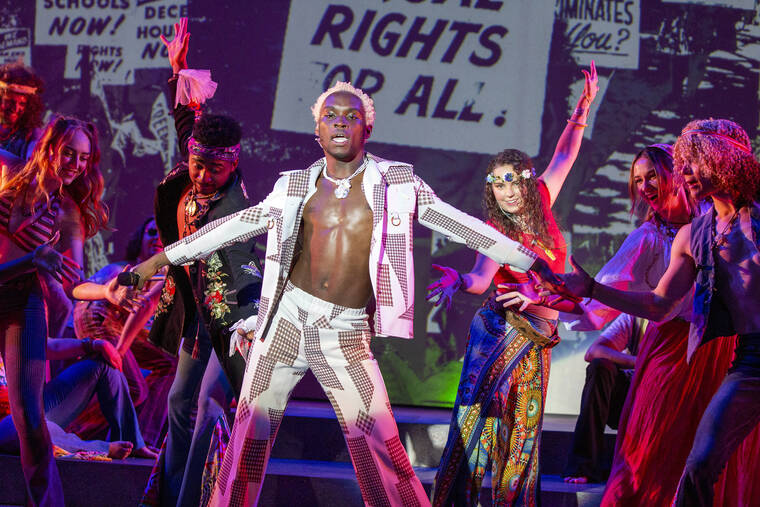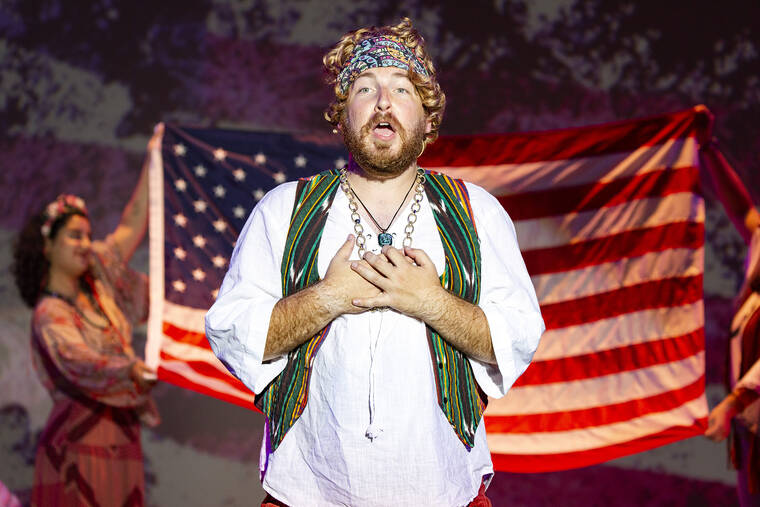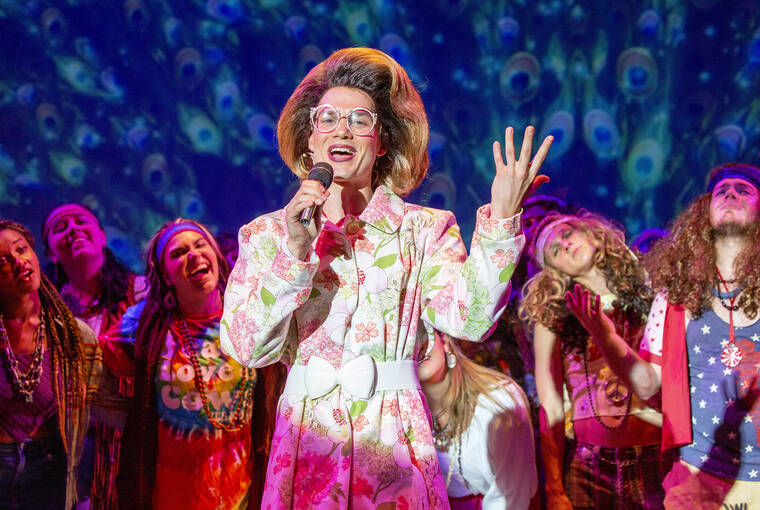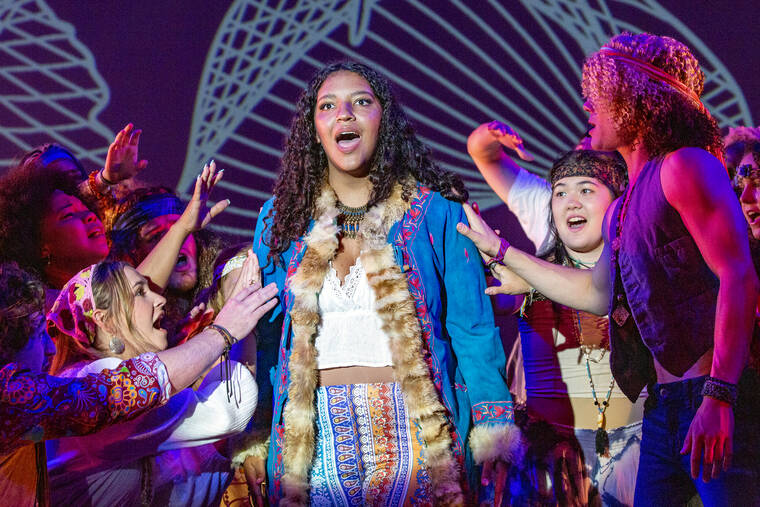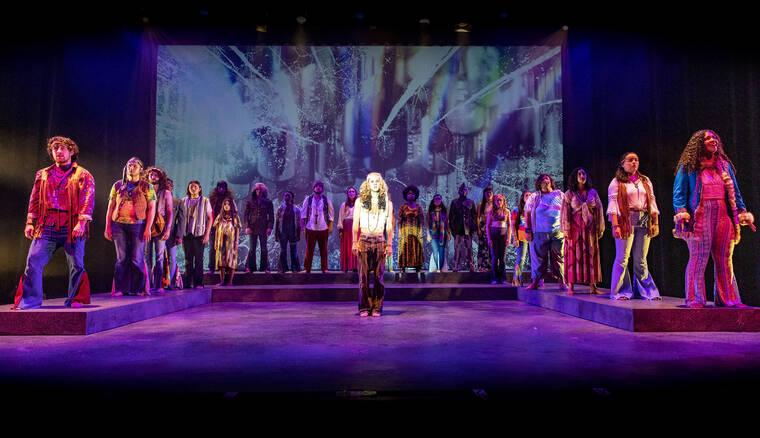Grooooovy, man. Psychedelic. As the audience trickled into Waimea’s Kahilu Theatre Saturday night, the stage was slowly filling to the brim with bell-bottomed, tie-dyed, head-banded hippies, meditating or writhing sensuously. Smoke wafted lazily across the scene. It was 1968 again. The scrim at the back of the stage featured a 1960’s vintage Peter Max style design that then left the scrim and panned across the “tribe,” lying prostrate on the stage floor. Then the light show left the stage and panned across the audience pulling us right into the action.
We hear percussion sounds emanating from the pit. One lone actor, sits upright, center stage. We will learn that this is Claude (Tyler Brunner), the show’s central character. A fellow tribe member snips a small lock of Claude’s exuberant, long, curly hair and places it in a sacrificial bowl. “Dionne” sung marvelously by Trinity Gray breaks into song: “This is the dawning of the age of Aquarius.” The words are familiar, but it is easy to forget what a groundbreaking work Hair was in 1967/68 when it first appeared in New York and then found its way to Broadway. Outlandish, irreverent, scandalous; it’s hard to say too strongly just how over-the-top this musical was when it was first produced. Nothing was sacred. Sex, drugs, and rock ‘n roll was just the beginning. Homosexuality, unwed pregnancy, nudity, blasphemy, profanity, even pot shots at the American flag were all featured as desirable self-expression. Today, most of these things seem tame or even ordinary, but at the same time, we continue to deal with some of these very same issues. Then, they rocked and shocked the world. Today, they threaten to divide us.
When Claude begins to strut his stuff, it’s impossible not to become enchanted with his compelling voice, electric moves, and total appeal. He “believes in God and believes that God believes in Claude.” So do we. When Claude rattles off everything he’s got (after first telling us everything he ‘ain’t got’), he twitches his ass so engagingly that we agree; he’s got something.
Hair’s strength does not lie in its plot. In fact, part of the show is an hallucinatory “trip,” so it’s easy to lose track of the action and what is real and what is not. Most of the thread is carried in song, not dialogue, but unlike early Broadway when shows were often an excuse for a musical revue, and we didn’t expect a plot, Hair has an important story to tell about the horrors of war, in this case, the Vietnam war, and the terrors suffered by the young men that were subject to the draft. That story weaves its way throughout the show, amid laughter, song, dance, spoofs, such as when several actors cross the stage in Vietnamese conical hats or when the scrim features helicopters spraying bullets or simply bullets blasting out of the scrim.
Early on Claude pretends to deface his draft card along with others he has collected from the tribe as he urinates freely on the papers. Seen only from behind, we react to the moment with laughter. Later, though, more draft cards are collected and burned (in pantomime) and the feeling is far more serious.
The voices, energy and moves of this young cast make the show heart-stoppingly marvelous in the moment and memorable, as well. Berger, played by Richie Cardile, is funny and appealing as he makes plays on words about his name. ‘Call me Cheeseburger”. When he sings, we love it. Joshua Credle as Hud is nothing short of masterful. We meet Hud hanging upside down, shirtless, from a bamboo pole from which he gracefully disengages himself and begins leaping and dancing his way back and forth across the stage, convincing us that he was born to play this role. Throughout the show, he is sexy, irreverent, and compelling.
Trinity Gray as Dionne has a stupifyingly wonderful voice, as does Summer Pearson in the take-off of the Supremes in the number “White Boys”. Jeanie, played by Mikayla Mindiola, as the hugely pregnant, unwed mother is marvelously sarcastic as she enchants us with “Air: which we learn includes sulfur dioxide and carbon monoxide, lest we forget that pollution was well understood even back in the 60s.
The serious side of this spectacle emerges regularly, lest we be lulled into complacency by all the wonderful singing and dancing. News clips on the scrim remind us that Martin Luther King was shot, Bobby Kennedy was mowed down. Four Buddist monks appear on the stage and the scrim images an immolation to remind us of the real immolation that happened. The Stonewall riots didn’t come until 1969, but Hair surely helped set the stage. Claude appears with his streaming, gleaming locks shorn wearing his new military uniform, and we’re not quite sure whether it’s real or an hallucination. The emotions are real, however. When we see a coffin appear on the scrim, draped in an American flag, we know just how real things can be.
In the end, though, we are all saved by starshine and sunshine. “Good Morning, Starshine,” sung charmingly by Sheila (Yumeko Stern), one of the show’s featured players (who nearly brings us to tears with “Easy to be Hard”), prepares us for the show’s grand finale, “Let the Sun Shine In.” The audience hums or sings along, and we all feel that the world just might go on. Tumultuous applause follow.
Photos Steve Roby









